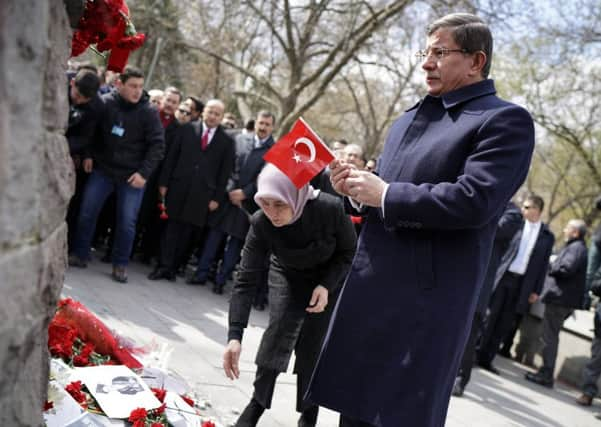Kurdish militants claims responsibility for Ankara attack


In a statement posted on its website, the Kurdistan Freedom Falcons said the attack in Ankara was in “revenge” for Turkish military operations against Kurdish rebels.
The group said the attack was led by Seher Cagla Demir, code name Doga Jiyan, described as its first female suicide bomber.
Advertisement
Hide AdAdvertisement
Hide Ad“We claim the operation of 13 March, 2016 at 6:45pm in the heart of the Republic of Turkey,” the statement said.
The Turkey-based group is considered an offshoot of the Kurdistan Workers’ Party, or PKK, and has carried out several attacks in the past including one in Ankara in February that killed 29 people.
The name in the claim of responsibility corresponds with the findings of Turkey’s interior ministry, which on Tuesday had identified the suicide car bomber as a 24-year-old woman who became a Kurdish rebel in 2013 and had trained in Syria.
More than 200 people have died in five suicide bombings in Turkey since July that were blamed either on the Kurdish rebels or the Islamic State group.
Three of those bombings have targeted Ankara.
Turkey is facing a host of security threats including renewed fighting with Kurdish rebels in the south-east of the country.
Germany closed its embassy in Ankara, the German school in Ankara and the consulate in Istanbul, after authorities received a security warning on Wednesday night.
Foreign minister Frank-Walter Steinmeier told reporters in Berlin that there were “some very concrete indications that terrorist attacks were being prepared against our facilities in Turkey”.
He did not say how long the facilities would be closed.
Germany, which has a large and long-standing ethnic Turkish population, has been a driving force behind a deal between the EU and Turkey to manage Europe’s migration crisis.
Advertisement
Hide AdAdvertisement
Hide AdGermany contributed Tornado reconnaissance jets, tanker aircraft and a frigate to the Western coalition battling the so-called Islamic State group.
The Kurdistan Freedom Falcons, also known as TAK, warned that there would be further reprisals for any “hostile operations against the Kurdish people” or jailed PKK leader Abdullah Ocalan. It said deaths were an “inevitable consequence of war.”
Since August, Turkey has been carrying out military operations and imposing 24-hour curfews on flashpoint districts of the south-east, where militants advocating Kurdish autonomy have set up barricades, dug trenches and planted explosives to keep the authorities at bay.
The military operations have caused vast damage to urban infrastructure and raised concerns over possible human rights abuse and civilian casualties. Tens of thousands of people have also been displaced. The decades-long conflict between the Turkish state and Kurdish rebels has claimed 40,000 lives.
Meanwhile the correspondent for German magazine Der Spiegel in Turkey has left the country after waiting unsuccessfully for three months for his press ID to be renewed.
German news agency dpa reported that diplomats escorted Hasnain Kazim and his family to the airport to make sure he could leave the country safely.